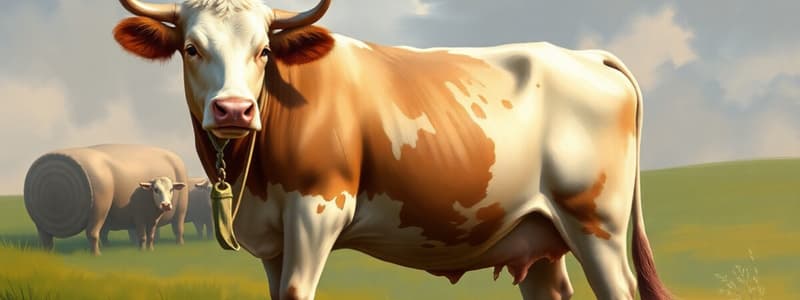Podcast
Questions and Answers
What is the primary reason for the faster growth rates of bulls compared to steers?
What is the primary reason for the faster growth rates of bulls compared to steers?
- Bulls have an innate genetic advantage.
- Steers do not produce testosterone, which inhibits their growth. (correct)
- Bulls have more efficient feeding habits.
- Steers produce testosterone which accelerates muscle growth.
What does the grading system in carcass quality primarily assess?
What does the grading system in carcass quality primarily assess?
- Overall health status of the animal pre-slaughter.
- The animal's age and breed.
- Fat content and animal's feeding history.
- Length of carcass and shape of hind quarters. (correct)
Which target weight at slaughter is assigned to a heifer?
Which target weight at slaughter is assigned to a heifer?
- 600kg
- 550kg
- 750kg
- 450kg (correct)
Which letter corresponds to the best quality in the EUROP grading system?
Which letter corresponds to the best quality in the EUROP grading system?
Why do bulls generally tend to be more violent compared to steers and heifers?
Why do bulls generally tend to be more violent compared to steers and heifers?
What factors are considered when grading carcass quality using the EUROP system?
What factors are considered when grading carcass quality using the EUROP system?
Which feature is typical of beef breeds compared to dairy breeds?
Which feature is typical of beef breeds compared to dairy breeds?
What is meant by 'conformation' in beef production?
What is meant by 'conformation' in beef production?
At what ages are beef cattle typically slaughtered based on breed and gender?
At what ages are beef cattle typically slaughtered based on breed and gender?
Which of the following is NOT a characteristic of beef breeds?
Which of the following is NOT a characteristic of beef breeds?
What is the average weight range for spring born suckler calves at birth?
What is the average weight range for spring born suckler calves at birth?
What is the daily live weight gain (LWG) difference between autumn born and spring born suckler calves?
What is the daily live weight gain (LWG) difference between autumn born and spring born suckler calves?
What is the recommended feeding space requirement for fattening cattle?
What is the recommended feeding space requirement for fattening cattle?
Which advantage is associated with using a stock bull instead of artificial insemination in breeding?
Which advantage is associated with using a stock bull instead of artificial insemination in breeding?
Which disadvantage can arise from using artificial insemination in breeding?
Which disadvantage can arise from using artificial insemination in breeding?
What does hybrid vigour in breeding generally refer to?
What does hybrid vigour in breeding generally refer to?
What is the recommended initial feeding amount of whole milk for a 45 kg calf per day?
What is the recommended initial feeding amount of whole milk for a 45 kg calf per day?
In a successful calf to beef system, which aspect is crucial for quality production?
In a successful calf to beef system, which aspect is crucial for quality production?
What is the ideal way to distribute milk feed for calves throughout the day?
What is the ideal way to distribute milk feed for calves throughout the day?
What should be introduced gradually to a purchased calf after its arrival to the farm?
What should be introduced gradually to a purchased calf after its arrival to the farm?
What should be the focus during the weaning process of calves from milk?
What should be the focus during the weaning process of calves from milk?
Flashcards are hidden until you start studying
Study Notes
Growth Rates in Beef Cattle
- Bulls grow faster than steers primarily due to steers not producing testosterone, which inhibits their growth.
- Steers exhibit reduced growth rates compared to bulls because of the absence of testosterone.
Carcass Quality Grading
- The grading system assesses carcass quality based on the shape of the hind quarters and overall fat content.
- The EUROP grading system uses letters, with 'E' representing the best quality.
- Factors like percentage of fat and meat content are considered when grading carcass quality.
Target Weights and Characteristics
- Heifers are typically assigned a target slaughter weight of 450 kg.
- Beef breeds usually have short and wide heads, contrasting with dairy breeds that tend to have long and narrow heads.
- The conformation of beef cattle refers to their shape and muscle distribution.
Slaughter Ages and Breed Differences
- Beef cattle are generally slaughtered at ages ranging from 12 to 30 months.
- Continental beef breeds are typically larger than British beef breeds.
Space and Weight Requirements
- The minimum floor space required for weanlings is 1.4 m².
- Spring-born suckler calves typically weigh between 40-50 kg at birth.
Daily Weight Gain
- Autumn-born suckler calves gain more daily live weight compared to spring-born, averaging 1-1.2 kg per day.
Feeding and Breeding Practices
- Fattening cattle require 0.4 m of feeding space.
- Using a stock bull for breeding is cost-effective compared to artificial insemination.
- A disadvantage of artificial insemination includes reliance on skilled technicians.
Hybrid Vigour
- Hybrid vigour refers to the enhanced performance of offspring from heterozygous parents, leading to superior traits.
Calf Feeding Guidelines
- A 45 kg calf should initially be fed 4.5 liters of whole milk per day.
- Calves should receive milk in two meals, split between morning and evening to ensure consistent intake.
Weaning Practices
- Gradual introduction to solid food is essential during the weaning process, while immediate pasture grazing should be avoided.
- Careful handling and gradual weaning are critical for quality production in a calf-to-beef system.
Studying That Suits You
Use AI to generate personalized quizzes and flashcards to suit your learning preferences.




